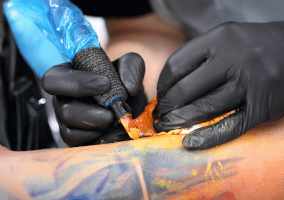Have you ever found yourself regretting a tattoo and considering laser tattoo removal? If so, you may be wondering if you can tattoo over laser tattoo removal. This is a common concern among those who have undergone the process or are contemplating it. In this blog post, we will delve into the topic of whether you can tattoo over laser tattoo removal, providing you with insights, tips, and practical advice.
Before we begin exploring the possibility of tattooing over laser tattoo removal, let’s first understand why this topic is relevant in the tattoo industry. Many people choose to get tattoos as a form of self-expression, but there may come a time when they regret a tattoo or want to make changes. Laser tattoo removal offers a way to remove or fade unwanted tattoos, making it easier to cover them up with a new design. By discussing whether you can tattoo over laser tattoo removal, we aim to address the needs and curiosity of those looking to modify their tattoos.
Can You Tattoo Over Laser Tattoo Removal?
One of the common questions that individuals have after undergoing laser tattoo removal is whether they can get a new tattoo on the treated area. The short answer is yes, you can tattoo over laser tattoo removal. However, there are certain considerations and steps to keep in mind to ensure the best results.
Step-by-Step Guide to Tattooing Over Laser Tattoo Removal:
- Ensure that the area has fully healed from the laser tattoo removal treatment before getting a new tattoo.
- Consult with a professional tattoo artist who has experience working on treated skin to discuss your desired design and placement.
- Consider the color and density of the existing tattoo, as well as the size and complexity of the new design, when planning the cover-up tattoo.
- Follow any aftercare instructions provided by your tattoo artist to promote proper healing and long-lasting results.
Practical Tips for Tattooing Over Laser Tattoo Removal:
- Choose a reputable tattoo artist who specializes in cover-up tattoos and has experience working with laser-treated skin.
- Opt for a design that effectively conceals the old tattoo while complementing your personal style and preferences.
- Be patient during the healing process and avoid picking at scabs or exposing the tattoo to excessive sunlight to prevent fading or damage.
Pros and Cons of Tattooing Over Laser Tattoo Removal:
While tattooing over laser tattoo removal offers a way to transform or hide unwanted tattoos, there are both advantages and disadvantages to consider.
Advantages:
- Allows for a fresh start by covering up old tattoos with new designs.
- Provides an opportunity to correct or enhance existing tattoos.
- Can result in a unique and personalized tattoo that reflects your current tastes and preferences.
Disadvantages:
- May require multiple sessions to achieve desired results, depending on the complexity of the cover-up tattoo.
- Can be more challenging and time-consuming than getting a regular tattoo, due to the need for strategic planning and design considerations.
- May involve additional costs for laser tattoo removal and cover-up tattoo services.
In conclusion, while it is possible to tattoo over laser tattoo removal, it is essential to approach the process thoughtfully and carefully. By following the steps outlined in this blog post and seeking guidance from experienced professionals, you can achieve a successful cover-up tattoo that enhances your skin and reflects your individuality.
FAQs:
Can I get a cover-up tattoo on a freshly treated area from laser tattoo removal?
It is advisable to wait until the treated area has fully healed before getting a new tattoo to ensure optimal results.
Are there any specific aftercare instructions for cover-up tattoos on laser-treated skin?
Follow the aftercare recommendations provided by your tattoo artist, which may include keeping the area clean and moisturized to promote healing.
Overall, tattooing over laser tattoo removal is a viable option for those looking to modify or conceal existing tattoos. By taking the necessary precautions and seeking professional guidance, you can achieve a new tattoo that meets your aesthetic preferences and enhances your skin.











